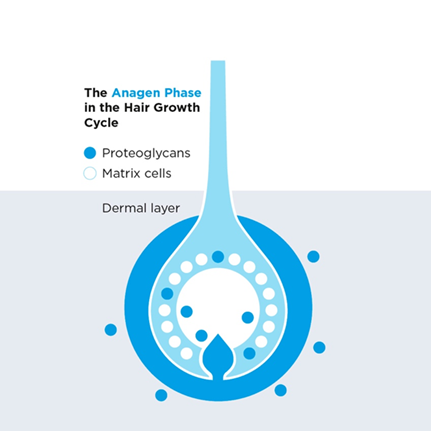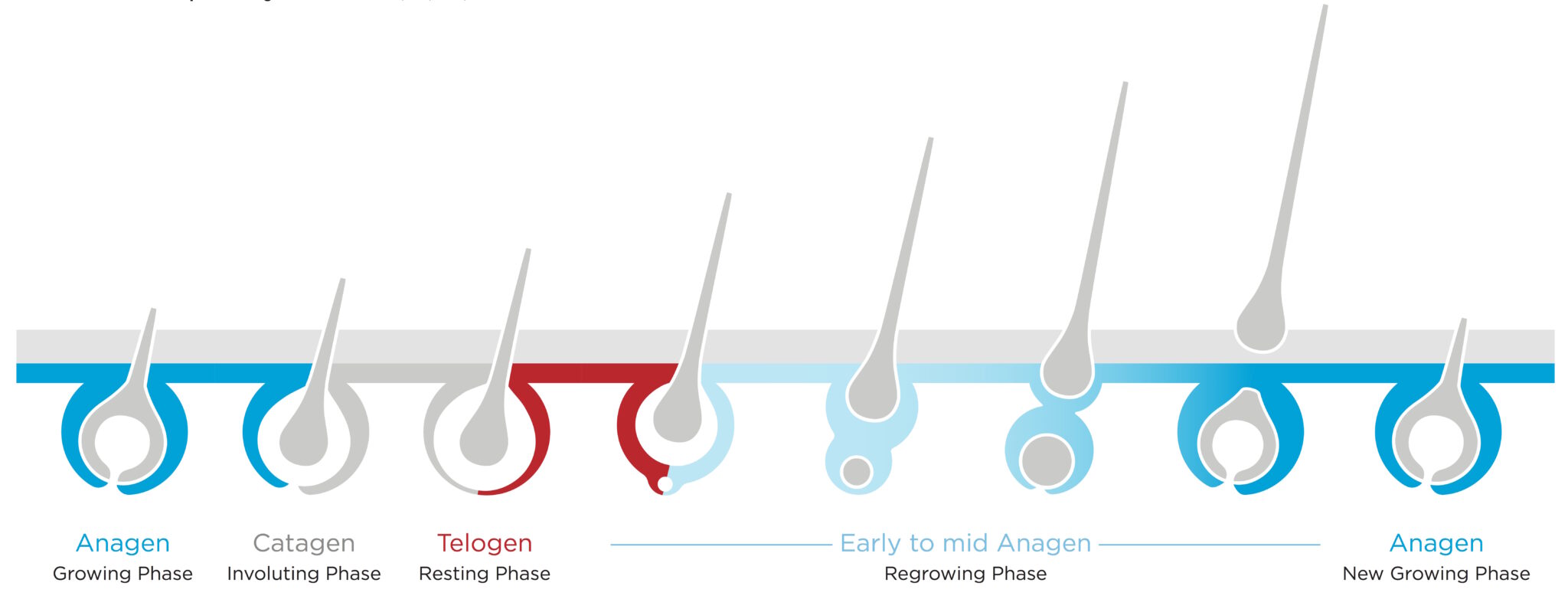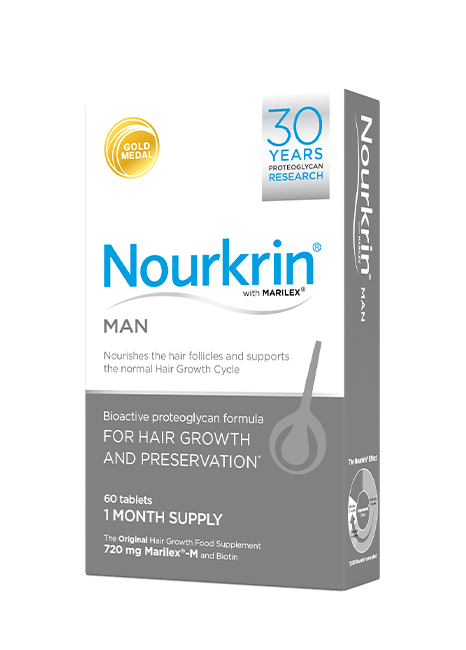You may feel that your hair is not growing as well as it once was – that there’s a lack of its previous density, especially on the crown or temples, and you may be noticing an increase in levels of falling hair. Maybe its appearance and condition are not as healthy as they have been previously.
All of these complaints are incredibly common. It is a fact that 50% of men will experience some degree of hair loss/thinning by the age of 50, and 80% during their lifetimes.
There are many factors which can trigger hair loss or hair thinning in men, such as genetics, stress, health, medication and, while hair loss as a result of hormones is usually associated with women, the male hormone Dihydrotestosterone (DHT) can negatively affect the Hair Growth Cycle. This is one of the most common causes of hair loss in men and is a key cause of Male Pattern Hair Loss, also known as Male Pattern Baldness, which is characterised by the traditional (stereotypical) receding frontal hair line and/or thinning hair on the crown of the head.
 Hair growth is governed by the process known as the Hair Growth Cycle, the job of which is to ensure that each follicle works its way through the stages of the Cycle in a proper and timely manner.
Hair growth is governed by the process known as the Hair Growth Cycle, the job of which is to ensure that each follicle works its way through the stages of the Cycle in a proper and timely manner.
In order for the Hair Growth Cycle to function properly, every hair follicle contains signalling molecules known as proteoglycans. These molecules dictate to the follicle how long it should stay in the growth phase of the Cycle, when to transition and when to shed the grown hair. Healthy, sustained, hair growth is therefore dependent on healthy follicles and healthy levels of proteoglycans within those follicles.
Some follicles are sensitive to DHT, which can cause a depletion of the levels of these proteoglycans in the hair follicle. When this happens, the Hair Growth Cycle becomes disrupted and subsequently leads to hair thinning and hair loss. The higher the level of DHT, the higher the risk of hair loss and, over time, high levels of DHT can cause sensitive hair follicles to miniaturise and, ultimately, perish. Sensitive follicles are usually located at the front of the hair line, at the temples and at the crown of the head, which is why the characteristic pattern of Male Pattern Hair Loss occurs mostly in these areas. High levels of DHT can also be responsible for a foreshortening of the Anagen (growth) phase of the Hair Growth Cycle.
 ANAGEN – 85-90% of the follicles on the head are in this stage at any given point. This is the part of the cycle where the hair is in the follicle and actively growing. This phase lasts for around 3-5 years on average.
ANAGEN – 85-90% of the follicles on the head are in this stage at any given point. This is the part of the cycle where the hair is in the follicle and actively growing. This phase lasts for around 3-5 years on average.
CATAGEN – Around 1% of the follicles are at this point in the cycle. This is where the active growth (Anagen) phase has ended and the hair sits inactive in the follicle. This phase lasts for around 2 weeks.
TELOGEN – The final phase of the cycle, lasting around 3 months. Around 10-15% of the follicles are in this phase at any given point. At this time, the follicle is preparing to shed the fully-grown hair at which point a new hair will form and, in a healthy follicle, the cycle will begin again.
When follicles start to experience miniaturisation as a result of consistently high levels of DHT, correspondingly, the hair produced by the follicle becomes more fine and wispy. Eventually, as the follicles become more affected by the DHT and the miniaturisation continues, the follicle will stop producing hair altogether and will fall dormant. Dormant follicles are at a high risk of perishing from high levels of DHT and, should this happen, the follicle would be unable to ever produce hair again. The only option available at that stage would be to undergo a hair transplant.
Similarly, as the Anagen phase of the Cycle remains shortened, the follicles will cycle through the Hair Growth Cycle faster, meaning that hair will not reach its full growth potential before shedding and the Cycle beginning again.
A healthy Hair Growth Cycle is dependent on healthy levels of Proteoglycans in the follicles, as depleted levels of proteoglycans within the follicles disrupt the ability of the follicle to perform properly. Replenishing and maintaining levels of these critical molecules is therefore key to supporting healthy hair growth.
Nourkrin® is the only Proteoglycan Replacement Therapy available on the market today. Its unique active ingredient, Marilex®-M, targets the core symptoms of all Hair Growth Cycle disruptions, by helping to re-balance the levels of proteoglycans in the follicle.
Unlike many other male hair growth products on the market, Nourkrin® does not contain chemical preparations or drugs which can have wider-reaching negative effects on the body. Safe and drug-free, the bioactive proteoglycans in Nourkrin® work with the body’s own natural Hair Growth Cycle, replacing the missing signalling molecules to ensure the health, structure, integrity and natural function of the follicle, helping to preserve the health and growth of the hair.
By rebalancing the levels of proteoglycans within the follicles to their natural, optimal levels, Nourkrin® helps to ensure…
 Nourkrin® was the first natural hair growth supplement on the market in the UK, developed and formulated to help in the preservation of hair for men at risk of male pattern hair loss.
Nourkrin® was the first natural hair growth supplement on the market in the UK, developed and formulated to help in the preservation of hair for men at risk of male pattern hair loss.
With an ongoing programme of clinical research into hair loss and its causes, and with currently more than 100 clinical papers that prove the efficacy of Nourkrin® in targeting the numerous causes of hair growth disruption, Nourkrin® is unique in its formulation and mode of action, meaning it is more than just another hair growth supplement.
Nourkrin® provides the precise ratios of the specific proteoglycans which help to regulate hair follicle function and the Hair Growth Cycle, therefore, it is clinically proven to help restore, normalise and maintain a healthy Hair Growth Cycle, leading to a reduction in excess shedding and an increase in, and prolongation of, Anagen growth.
In a recent study, more than 90% of people taking Nourkrin® showed an improvement in the condition, volume and overall health of their hair after 6 months use.
Want to know how Nourkrin® can help you? Why not read what some of our users had to say about their Nourkrin® experience?
Or visit the Nourkrin® webshop
Need help? Why not contact us?
Do you need help, information, or just want to get in touch with us?
Contact us by phone or email:
Email: [email protected]
Visit these pages for further reading: